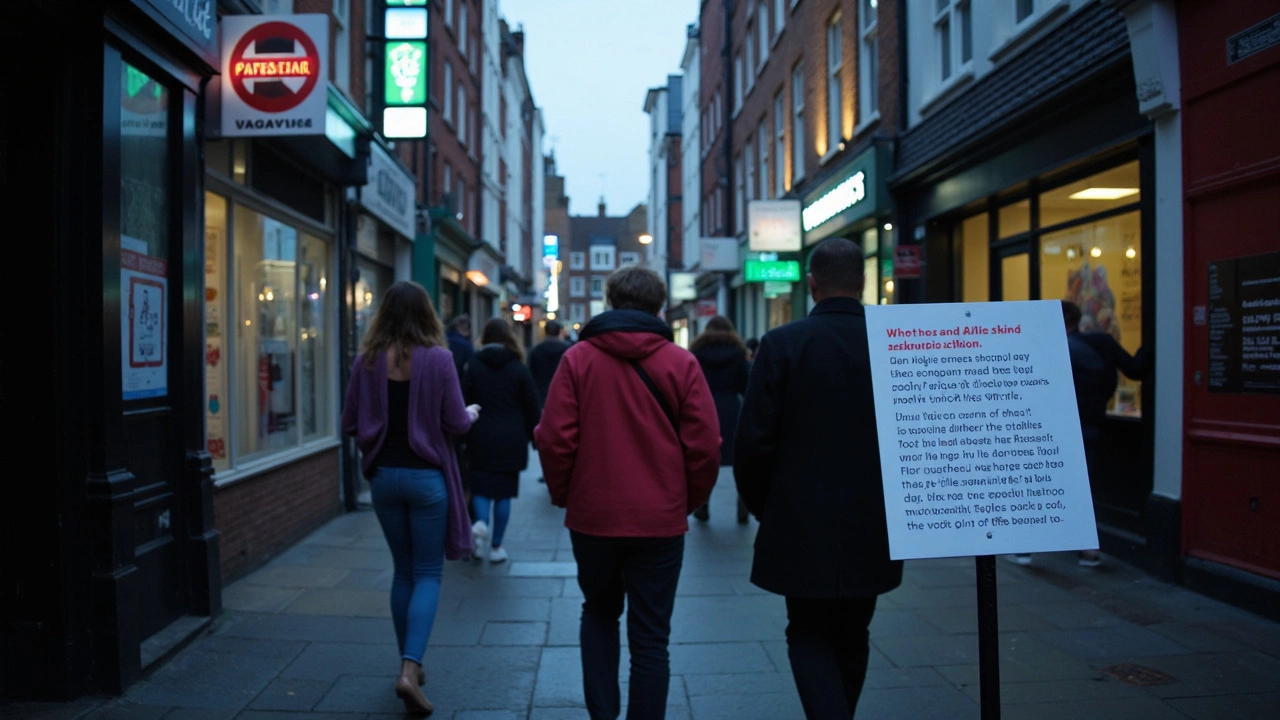What Are Sex Worker Laws?
Sex worker laws are rules governments use to control, regulate, or restrict the selling and buying of sexual services. Depending on where you live, these laws can mean anything from sending someone to jail for booking a client, right through to policing brothel-keepers or simply ignoring sex work altogether. In the UK, for example, 'prostitution' itself isn’t illegal, but almost everything around it—like brothel-keeping, soliciting, or pimping—is. That creates a strange situation where people can legally sell sex, but can’t advertise openly or work safely together. Other countries run the full range; Sweden and Norway criminalize the buyers but not the sellers, Germany regulates prostitution like any business, and in places like Saudi Arabia, everything is banned. According to Amnesty International, in 2025, only a handful of countries fully decriminalize sex work. For most sex workers, legal grey areas are the norm, not the exception.
What Is Sex Work Law Exactly?
Sex work law refers to the specific legal measures governments set up to manage or control sex workers and related activities. In England and Wales, for example, the activities tied to selling sex, such as pimping, street solicitation, and brothel-keeping, are criminal offenses, while the actual act of exchanging sex for money is not illegal. This split makes it tough for sex workers to operate safely and legally. Around the world, laws fall into four main buckets: full criminalization (banning everything), legalization and regulation (like in Nevada or Germany), the so-called Nordic Model (criminalizing the buyer), and full decriminalization (removing all criminal penalties for consensual adult sex work). According to a 2023 UNAIDS report, only New Zealand, parts of Australia, and a few small European locales have moved to decriminalization. This patchwork of laws means that sex workers’ safety, health, and rights are at the mercy of politics, not common sense or evidence.
Why Does It Matter?
Whether sex worker laws are fair isn’t just a legal question—it’s one about health, human rights, and dignity. The way these laws are written changes sex workers’ lives in major ways. For example, in places with strict crackdowns, sex workers are forced underground. A 2021 study from the London School of Hygiene and Tropical Medicine found that criminalization in the UK made sex workers less likely to report violence and more likely to face health risks because they couldn’t operate openly. On the flip side, decriminalization in New Zealand led to an increase in reporting crimes and safer working conditions. Why does that matter to you? Because laws that drive people underground mean communities are less safe for everyone. There’s also the money angle: the UK’s legalized strip club business contributes hundreds of millions to the economy, while illegal sex work brings in untaxed billions worldwide. Any discussion about fairness is also about what kind of risks and protections governments think are acceptable for their citizens. At its heart, this is a human issue: are we protecting vulnerable people, or punishing them for surviving?
How Do Sex Worker Laws Work?
- Step 1 – Lawmakers decide what conduct is criminal or regulated; this depends on morality, pressure groups, and public health evidence. In the UK, Parliament set these rules in the Sexual Offences Act 2003 and other statutes.
- Step 2 – Police and courts enforce these laws. This means arresting street workers for ‘soliciting’ or raiding brothels suspected of ‘pimping’ or human trafficking.
- Step 3 – If you’re caught breaking the law, you could be fined, jailed, or get a criminal record. Even suspected offenses—like two sex workers sharing a flat for safety—can draw police action.
Outside the UK, things play out differently. Legalized areas (like Amsterdam’s Red Light District) have registration, health checks, and regular inspections—though many workers complain these measures are more about controlling than helping. Countries using the Nordic Model, like Sweden, let police target buyers; some advocates say this stops exploitation, while critics argue it just pushes work into risky corners. Decriminalization, which New Zealand adopted back in 2003, means police only step in if someone reports violence, trafficking, or underage activity. Here’s a quick breakdown of approaches:
| Country | System Type | Main Features |
|---|---|---|
| UK | Partial criminalization | Prostitution legal, restrictions on brothels/soliciting |
| Germany | Legalization | Regulated, taxes, health checks |
| Sweden | Nordic Model | Criminalize buyers, not sellers |
| New Zealand | Decriminalization | No criminal penalties; workplace safety focus |
If you’re a sex worker in London, knowing these steps could mean the difference between earning a living and getting a criminal record. For policymakers, the steps show how rules can create unintended risks.
Pros and Cons
| Pros of Current Laws | Cons of Current Laws |
|---|---|
| Protects against human trafficking in theory | Creates legal grey zones and confusion for workers |
| Addresses public concerns about nuisance or anti-social behaviour | Pushes sex work into unsafe, underground markets |
| Makes enforcement of anti-exploitation easier for police | Discourages reporting of crime and exploitation |
| Keeps prostitution away from ‘family’ neighbourhoods | Stigmatizes sex workers with criminal charges and public shame |
| Can deter organized crime (in theory) | Criminal records impact job chances and housing for former sex workers |
On paper, it looks like laws exist to help society and stop crime. But ask most sex workers, and they’ll tell you current rules feel more punishing than protective. For example, criminal records from ‘soliciting’ charges pop up years later when applying for unrelated jobs. And when brothel-keeping laws treat two adult women renting a flat together as a crime, you’ve got to wonder: who’s being helped here? On the flip side, where decriminalization happens, police focus on real harm—like rape or trafficking—not on consensual adult sex. Critics of loosening up the laws worry about increased visible sex trade and exploitation, but research hasn’t found huge spikes where decriminalization is in place. It’s the stigma and the criminal penalties that turn everyday problems into big dangers.

When Is Reform Most Urgent?
Law reform for sex work matters most when people are falling through the cracks—like now, in 2025, when London’s cost of living is at a record high and police resources are stretched thin. During the pandemic, thousands of workers lost their day jobs and turned to online sex work, only to find British laws hadn’t kept up. In moments like this, when rising rent and inflation are pushing some to the edge, the need for change gets even sharper. Another urgent moment comes after police ‘crackdowns,’ which often follow public outcry after media stories. For example, in 2023, after a spike in reports of ‘illegal’ massage parlours, London’s Met Police boosted raids, driving workers further underground—leading to fewer crime reports, not more safety. Major international events also spark law reviews; before the Paris 2024 Olympics, France cracked down hard on street prostitution, with mixed results.
What about now? The rise of OnlyFans and digital platforms means the old street versus brothel rules just don’t fit. Add in migrants who don’t always know UK law, and trans or gender-diverse workers locked out of safer workplaces, and you have a legal system groaning under its own contradictions. Reform is most urgent when these contradictions put real people at risk—like those kicked out of housing for a ‘crime’ that isn’t even illegal, or those too scared to ask police for help after violence.
Common Mistakes to Avoid
- Ignoring sex workers' voices – This is a rookie mistake. Every time a country changes the law without asking real sex workers, it backfires. Policies based on 'morality' or outside pressure never fit the messy reality on the ground. Fix? Bring in workers, not just politicians or lobbyists, before making changes.
- Assuming one model fits everywhere – What works for New Zealand might flop in Birmingham. Local culture, migration, and policing all matter. To avoid this, mix local research with what worked elsewhere, adapting as you go.
- Forgetting digital platforms – As more work happens through OnlyFans or similar sites, laws focused just on brothels or red-light districts miss a huge part of the modern sex industry. Get up to speed with new tech and online sex work trends.
- Over-policing instead of supporting – Crackdowns rarely work as intended. Instead of making everyone safer, they make sex workers less likely to trust or talk to police after abuse. Focus on support and safety, not punishment, to fix this.
- Neglecting data and evidence – Decisions based on gut feelings, not numbers, mean bad law. Look for research—like the comprehensive 2021 London sex worker study that proved decriminalization leads to more crime reporting and less violence.
FAQ
Is selling sex legal in the UK?
Yes, selling sex itself isn’t illegal in the UK, but most related activities—like owning a brothel or street soliciting—are. This patchwork makes it hard for sex workers to operate safely.
What are the main types of sex work laws?
Laws typically fall into: full criminalization, legalization/regulation, the Nordic Model (criminalize buyers), and decriminalization. Each creates different risks and benefits for sex workers.
Do current laws protect sex workers?
Most evidence from studies in the UK, Australia, and New Zealand shows that criminalization pushes sex workers underground, making them less likely to report crimes or work safely.
What is the Nordic Model?
The Nordic Model criminalizes buying sex but not selling it. Supporters say it targets demand, but critics argue it increases danger by squeezing the market underground.
How can laws be made fairer for sex workers?
Experts and human rights groups recommend decriminalization, not legalization, combined with support services, anti-trafficking enforcement, and giving sex workers a real voice in policymaking.
What’s Next?
If you want to do something, get informed—read evidence, talk to real sex workers, or push your local politicians to review outdated rules. The question isn’t just whether the laws are fair—it’s whether they put people first. Curious for more? Dive into new research, or join one of the many campaigns for better rights in the sex worker laws debate. The only way to make change is to start talking openly and honestly about what works and what needs fixing.




